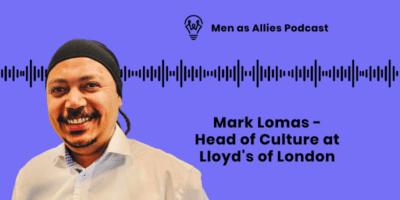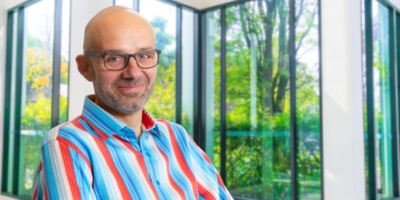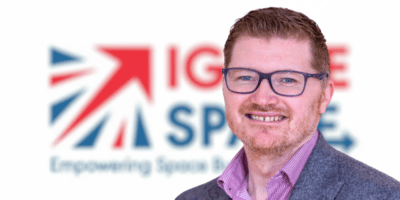Micael Johnstone is co-founder of Wading Herons Group, and he is a strategic advisor on environmental, social and corporate governance (ESG), purpose, culture, impact, connecting people, ideas and energy, as well as the future of business and data. Wading Herons Group is a human-centred business ecosystem, making businesses future-fit, happier, more connected and human. Micael also works with Contexis, a data business that improves company performance by unlocking purpose and human potential through advanced analytics and unique insights.
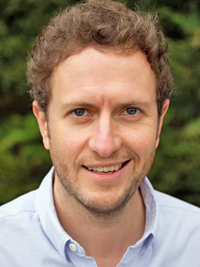
“Let’s face it, human beings are a complex bunch and so they can be challenging, but I’d say the challenge is the rewarding bit, and when you genuinely embrace this it needs to be backed up with action, and not just talking a good game.”
A purposeful career
I studied journalism at university, so I developed skills around communication, as well as thinking about politics, business and the economy. My first job after this was as an investment analyst focusing on, what was at the time, a new emerging trend of responsible investment that is now known as ESG (environmental, social and governance). Since then, I’ve had various roles in the better business space, most recently at EY, leading their purpose strategy team and now I’m running my own company, so what I’m doing now is much more entrepreneurial.
Making business better
When I left EY, I was really keen first and foremost to bring together new ideas and diversity of perspective, having felt that the corporate world is often pretty narrow in its sphere of thinking.
I gathered together a really cool group of about 50 or 60 people in a tribe that we call Wading Herons. The group is made up of people from all kinds of backgrounds, people who were very senior in corporations, a couple of former CEOs, people who run their own really interesting consulting businesses, but also people from the world of psychology, neuroscience, and creativity.
From Wading Herons, which was set up a couple of years ago, I’m now increasingly also focusing on the measurement side of business because I’ve come to realise that measurement and data are all in the world of big organisations. I think I knew it already but my experience with Wading Herons is that if you want to change organisations, the starting point really has to be: “How does this make commercial sense?” because that ultimately is the only metric people are focused on.

Day-to-day I’m doing several things right now. There’s a lot of building coalitions and building opportunities for the data business, so I’m out and about speaking at events, having lots of meetings and doing a bit of writing, as well as developing the products for the data business.
Toxic masculine cultures don’t benefit anybody
In that my life in the world of big business I’ve always felt that most of these organisations are far from inclusive. They are still largely run by a fairly elite set of individuals. There’s increasing gender diversity, and sometimes other types of diversity, but you still mostly find that people come from broadly similar academic backgrounds, broadly similar universities, MBA programmes and so on, so there’s a real narrowness of perspective as a result.
That’s not to criticise these people, of course, because we’re all just products of our environment and our learning, but I think that really limits what organisations can achieve, given we are at a time where we do need to undergo some pretty systemic and profound change, both at a social and environmental level. We need new thinking, so that’s the big driver.
I’m lucky enough to be surrounded by lots of really inspiring female friends, (and my wife’s pretty amazing too!) but I’ve seen the toll on women in these high-stress, very masculine environments. The irony is that toxic masculine cultures don’t work for men either. This is just wrong, and I want to do something to address this.
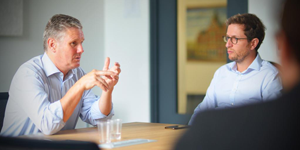
Having one son already and another, with all the luck in the world, arriving in October, I think another role for me as a father, and a friend to lots of men, is to help the next generation of men to be better, and encourage this generation to help address the toxic, detrimental roles that men can play in both workplace and wider society.
Diversity equals better connections
Diverse talent is the best kind of talent because, for a start, it’s more fun to be surrounded by people from different walks of life. You’re going to learn more, you’re going to grow more on a personal level, but then that also extends to the organisation as well. You’re going to get better, more diverse, more creative, more innovative, more thoughtful ideas that drive better service, regardless of what sector you’re in.
There’s also the consumer perspective. If you look at an organisation and you can see that it is a representation of who you are, regardless of where you’re from, then you’re more likely to build a rapport and relationship with that organisation.
Using data to make organisations more commercially successful, but also fundamentally happier, more joyful and more trusting
Data is a really important part of any change programme, or indeed any decision to make a change, because humans, particularly in organisations that are very focused on the quantifiable, are very reluctant to do anything in the absence of very clear data. So, we need that data to make sensible decisions, and in terms of changing human performance, once you have good data that’s focused in the right areas, it can get beneath the surface of the qualitative and you can make better-informed decisions.
They might know what they feel the organisation is like, but in the absence of certainty and knowing, they can see that this part of the business for example, is less productive for whatever reason. Maybe there’s an absence of trust, maybe there’s an absence of some really basic stuff like joy and happiness and fulfillment. Once you know that, you can focus on those areas and learn from the parts of the business that are doing well to make the whole business perform better
What I really like about Contexis is that they have been gathering data and information now for seven years from hundreds of organisations across 50 countries around the world.
So, once you’ve got that kind of robust data set that’s not only incredibly large but it’s also robust, then you can really start to understand not just what’s happening but why? And you can start to predict what will happen when you start to make changes and interventions, so you know not only which lever to pull, but in which parts of the organisation. You’ll then, with enough data, you’ll be able to accurately predict what will happen when you pull those levers.
For example, if I build greater trust with mid-level female leadership cohort in my Paris office, as a result, retention will increase by 15 to 20%. Or if I focus on the next generation of leaders in Berlin or Sheffield, and I uncover that, say 70% of them are close to burnout, then that’s a huge potential commercial risk for business. So, let’s focus on that in a targeted way and ensure that those people don’t burn out.
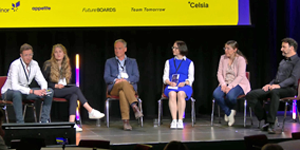
The reason we’ve developed this data product is to give leaders the certainty and clarity to make more fundamental, transformational human changes, so this is not just to make organisations more commercially successful, which is important, but also fundamentally happier, more joyful, more trusting places to be, which is equally important.
The big three — trust, ownership, purpose
The three key things that have come up universally in all the research into this stuff around the world over the years are:
- Trust is absolutely vital. In the absence of trust, you just are not going to thrive as an organisation.
- Ownership is absolutely key. You need to give employees a sense that ‘this is mine’, even if it’s not a co-operative or a partnership, but just give them agency and license to make decisions and do things. (And that can only happen when you have a bedrock of trust.)
- What is the context here? What is the purpose of what I’m doing beyond just making money?
If you give people a clear sense of all those things — trust, ownership and context or purpose, then we can see very clearly in the data that organisations perform significantly better. There’s a direct linear relationship between these things and organisational performance.
Big organisations in particular need the reassurance of data to give them the agency to make decisions that they would probably like to make anyway, but they might otherwise worry about. Tweaking something that’s broadly commercially successful already is usually harder to justify.
Culture — you want the truth, but can you handle the truth..?
There’s a phrase that a good friend of mine uses quite often: “This issue is top of the priority list, but bottom of the to-do list.” And when it comes to organisational culture, employees who are there day-in, day-out, even if they’re there remotely (and if they’re there remotely the company needs to make even more of an effort to build that authentic culture), will feel it and they will see the gap between what the leader is saying and their lived experience.
I would argue that if the leader is standing up in places like Davos (or at conferences or company town hall meetings), or writing a blog post on the intranet saying what a wonderful place it is to work but the reality is different then it’s dangerous. If their people are being burnt out and are in a place of fear, worried about their jobs, and are generally not being incentivised to drive positive culture, be collaborative, then that will erode value more and it will do more harm than good.
Let’s face it, human beings are a complex bunch and so they can be challenging, but I’d say the challenge is the rewarding bit, and when you genuinely embrace this it needs to be backed up with action, and not just talking a good game.
Coming up next
There are all kinds of things I’m looking forward to. I’m always optimistic. I’m looking forward to a world where we move beyond just talking good game, because lots of the issues that people in the better business world have been advocating for over a long period of time now are much higher up the corporate priority list, but whether they’re high up the to-do list still remains to be seen.
I’m looking forward to a world where people working inside organisations are genuinely empowered to effect this real change.

The thing that gives me real hope is that the next generation, their values system and their expectations of organisations are very different. I know that at senior executive level one of the significant worries, in addition to profitability, is: “How do we attract and retain the next generation that’s going to drive our business forward?” I think that is going to be one of the key reasons why organisations actually make the change.
The next generation of leaders will just do it because they believe in it and the current generation of leaders now feel that they have no option but to embrace this stuff positively. I’m inspired by the next generation and on that point, personally with another little boy due to arrive later this year, I’m very excited both for my new son’s arrival and also the future of organisations in the world at large.
Header image credit: diane.grytsku on Freepik and rawpixel.com on Freepik


